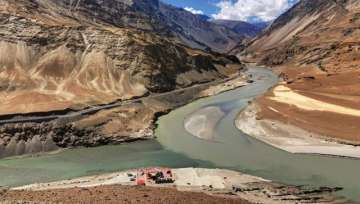Pakistan on Tuesday approached the International Court of Justice over implementation of the Indus Waters Treaty, with senior Pakistani officials taking up the matter with the World Bank.
A delegation led by the Attorney General for Pakistan, Ashtar Ausaf Ali, met senior officials of the World Bank at the World Bank Headquarters in Washington to discuss matters relating to Pakistan's recent Request for Arbitration given to India pursuant to Article IX of the Indus Waters Treaty, 1960, said Geo News.
On August 19, Pakistan formally requested India for settlement of outstanding disputes pertaining to India's construction of Kishenganga and Ratle hydroelectric plants on rivers Neelum and Chenab respectively, by referring the matters to the Court of Arbitration as provided in Article IX of the Treaty. Under the Treaty, the World Bank has an important role in establishment of the Court of Arbitration by facilitating the process of appointment of three judges, called Umpires, to the Court, while each country appoints two arbitrators.
Pakistani officials metsenior Officials of the World Bank to insist on early appointment of the judges and empanelment the court.
The move comes as Prime Minister's Advisor on Foreign Affairs and Security, Sartaj Aziz said an attempt by India to block Pakistan's water could be seen as an act of war.
Speaking on the National Assembly floor, Aziz said China would get justification to block Indian water if New Delhi did the same to Pakistan.
Aziz briefed lawmakers on the Indus Water Treaty starting that international law prohibits Indian from unilaterally changing the treaty. He said the treaty was not even suspended during Kargil and Siachen wars.
On Monday, Indian Prime Minister Narendra Modi met officials to review provisions of the Indus Water Treaty with Pakistan and to increase India's use of the river waters During the meeting Modi was quoted as saying "water and blood can't flow at the same time".
The Indus Waters Treaty, 1960 was negotiated by India and Pakistan under the auspices of the World Bank, and gives India complete rights to usage of waters of the Eastern Rivers (Ravi, Chenab, and Beas) and Pakistan rights over Western Rivers (Indus, Jhelum, Chenab) with limited allowance of use of water by India from the western rivers for purposes of, among others, power generation.
The Treaty provides specific design criteria for any hydro-electric power plants to be built by India. Pakistan has held the position the Kishenganga and Ratle hydroelectric plants violate the design parameters of the Treaty, said Geo.
(With IANS inputs)
Latest World News
